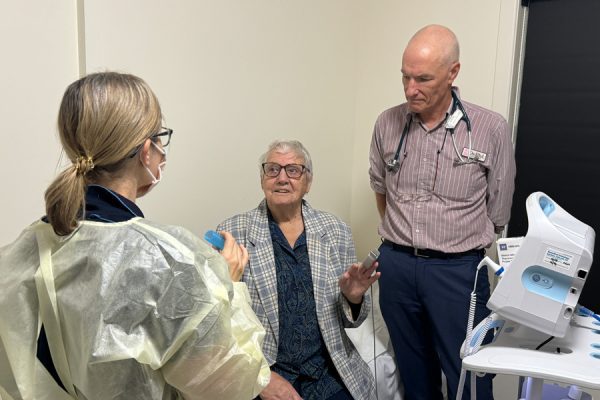Bronchiectasis clinic helping patients breathe easier

Respiratory physician Dr Phil Masel and the team with patient Pamela.
A new specialist clinic at The Prince Charles Hospital (TPCH) is allowing patients with a commonly underdiagnosed chronic lung condition to receive improved care.
Bronchiectasis is a complex lung condition where the airways become inflamed and enlarged, leading to symptoms including chronic cough, sputum production and recurring chest infections.
The new bronchiectasis clinic provides patients with integrated medical and physiothera
py care, to provide education and targeted therapies to help effectively manage their chronic condition.
Respiratory physician Dr Phil Masel said that bronchiectasis is often misdiagnosed due to its similarity to the more common chronic lung disease Chronic Obstructive Pulmonary Disease (COPD).
“Bronchiectasis and COPD can commonly be seen to occur together when looking at CT scans from sufferers,” Dr Masel said.
“However, making the correct diagnosis of bronchiectasis is important as the two conditions respond to different treatments.
Bronchiectasis is common in respiratory clinics and certainly not rare in the community.
“If left untreated correctly overtime, bronchiectasis can result in severe inflammation and long-term damage of the lung airways. In the worst cases, the condition may result in the need for a lung transplant,” Dr Masel said.
“The effective management of the condition requires a timely diagnosis followed by specific targeted medication therapies which are readily available through the clinic.
“Our clinicians are experts in the management of chronic lung diseases and have the expertise to make an accurate diagnosis and deliver appropriate treatment.
“Patients have access to respiratory tests to confirm airways obstruction, assess severity and provide better characterisation of the disease.”
Importantly in the new bronchiectasis clinic, patients will be seen by specialist physiotherapists, and provided education on exercises to perform to clear sputum from the lungs effectively. These techniques are key to preventing infections and improving the day-to-day quality of life with people with bronchiectasis.
“Patients with bronchiectasis produce a lot of mucus in their lung airways which makes it difficult to breathe,” Dr Masel said.
“Physiotherapy plays a critical role in managing flare ups and keeping the lungs clear for day-to day wellness.
“By having timely access to a specialist team, patients can get the treatment they need sooner to help the manage their condition and enjoy a better quality of life.”
It is expected that the clinic will see around 200-300 patients every year.
